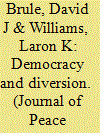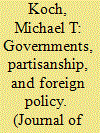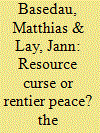|
|
|
Sort Order |
|
|
|
Items / Page
|
|
|
|
|
|
|
| Srl | Item |
| 1 |
ID:
093087


|
|
|
|
|
| Publication |
2009.
|
| Summary/Abstract |
Do legislative constraints constrain or compel democratic executives' conflict behavior during periods of economic decline? Although institutional constraints are thought to reduce democratic executives' propensity to engage in interstate conflict, other research suggests that such constraints may provide incentives to engage in diversionary uses of force. Incorporating work from the comparative study of economic voting and cross-national research on the diversionary use of force, this article contends that government arrangements - coalition, minority, weak party cohesion - influence democratic conflict behavior by (1) shaping the extent to which the executive is held accountable for the economy and (2) determining the executive's capacity to address the economy with legislation. Specifically, the argument presented here suggests that governing parties in coalition governments share the blame for a poor economy, reducing the likelihood that the executive initiates disputes in response to the economy. Compared to single-party majority governments with high party discipline, executives presiding over minority governments, or whose parties are plagued by a lack of cohesion, are more likely to initiate disputes when faced with poor economic conditions, because these executives are likely to face resistance to remedial economic policy. Probit analyses of the interactive effects of government arrangements and economic performance on dispute initiation among industrialized democracies, 1950-97, support the argument. The article concludes with implications for research in comparative politics and international relations, including, for example, executive-legislative relations and strategic conflict avoidance.
|
|
|
|
|
|
|
|
|
|
|
|
|
|
|
|
| 2 |
ID:
093089


|
|
|
|
|
| Publication |
2009.
|
| Summary/Abstract |
Do variations in partisanship and political outcomes among democratic states affect the duration of militarized interstate disputes? To answer this question, the author develops a model of partisan competition derived from the government failure literature. The author argues factors associated with government failure determine the ability of governments to contend with the domestic political costs of militarized disputes, specifically the duration of those disputes. The author tests his expectations using hazard analysis on a dataset of 20 democratic governments and militarized disputes between 1945 and 1992. The results suggest the outcome of party competition in the form of a government's sensitivity to the potential political costs of conflict is an important part of the conflict process. The author concludes that differences in domestic political outcomes influence the duration of militarized interstate disputes. Governments that are politically more secure in their tenure engage in longer disputes. Alternatively, governments that are more vulnerable have significantly shorter disputes. In addition, because government partisanship contributes to vulnerability, it also affects dispute duration, with governments of the left engaging in shorter disputes, while governments of the right fight longer disputes.
|
|
|
|
|
|
|
|
|
|
|
|
|
|
|
|
| 3 |
ID:
093084


|
|
|
|
|
| Publication |
2009.
|
| Summary/Abstract |
This article investigates the determinants of logistical and negotiation success from the terrorists' viewpoint in hostage-taking missions. Logistical success indicates that the terrorists apparently completed the mission as planned, while negotiation success means that the terrorists received some of their initial demands. In the empirical analysis, the article utilizes a new dataset on hostage incidents from 1978 through 2005 for the logit regressions. Empirical results broadly support the authors' theoretical predictions. Logistical success depends positively on terrorist resources and target vulnerability, while negotiation success increases with the relative disagreement values and relative bargaining strengths of the terrorists. More specifically, terrorist success at the execution stage depends positively on kidnappings and large hostage grabs and varies negatively with attack force diversity and terrorist casualties. Negotiation success depends on bargaining variables (i.e. the number of hostages, casualties, incident duration, and other proxies). The article shows that the factors that determine terrorist negotiation success differ between kidnappings and non-kidnappings (i.e. skyjackings, the takeover of buildings, and the hijacking of non-aerial means of transport), owing to location and other considerations (e.g. types of demands). In particular, making multiple demands bolsters negotiated success in non-kidnappings, while demanding money fosters negotiated success in kidnappings. Lengthier incidents have a positive influence on the likelihood of terrorists gaining concessions in kidnappings and non-kidnappings.
|
|
|
|
|
|
|
|
|
|
|
|
|
|
|
|
| 4 |
ID:
093091


|
|
|
|
|
| Publication |
2009.
|
| Summary/Abstract |
Scholars and policymakers have turned increasing attention to questions of transitional justice, those legal responses to a former regime's repressive acts following a change in political systems. Although there is a rich, interdisciplinary literature that addresses the value of various transitional justice measures, theoretical arguments for how and under what conditions we should expect to see these measures implemented tend to gravitate to intuitively appealing relative power considerations. But attempts at parsimony have tended to leave the dependent variable either overly restrictive or poorly defined, yielding theories that are difficult to test. In this article, the author proposes a 'transitional justice spectrum' based on a hierarchical series of possible accountability mechanisms and designed to allow researchers to conduct more rigorous, cross-national tests of justice arguments. The objective here is not to posit a broad theory of transitional justice, but to open the debate into a methodological weakness in the transitional justice literature. The article includes seven accountability mechanisms: cessation and codification of human rights violations; condemnation of the old system; rehabilitation and compensation for victims; creation of a truth commission; purging human rights abusers from public function; criminal prosecution of 'executors' (those lower on the chain-of-command); criminal prosecution of commanders (those higher on the chain-of-command).
|
|
|
|
|
|
|
|
|
|
|
|
|
|
|
|
| 5 |
ID:
093086


|
|
|
|
|
| Publication |
2009.
|
| Summary/Abstract |
The 'resource curse' hypothesis claims that abundance in natural resources, particularly oil, encourages especially civil war. Natural resources provide both motive and opportunity for conflict and create indirect institutional and economic causes of instability. Contrarily, the theory of the rentier state - largely neglected in the study of peace and war in this respect - suggests that regimes use revenue from abundant resources to buy off peace through patronage, large-scale distributive policies and effective repression. Consequently, such rentier states would tend to be more stable politically and less prone to conflict. These two theories thus imply ambivalent effects of resource abundance on conflict proneness. This article presents part of a solution to this apparent puzzle for the case of oil-producing countries. The key argument is that both resource wealth per capita and resource dependence need to be taken into account, since only the availability of very high per capita revenues from oil allows governments to achieve internal stability. The empirical analysis supports this hypothesis. The findings of multivariate cross-country regressions indicate a U-shaped relationship between oil dependence and civil war onset, while high resource wealth per capita tends to be associated with less violence. The results of a macro-qualitative comparison for a reduced sample of highly dependent oil exporters are even more clearcut. Using the same reduced sample, we find that oil-wealthy countries apparently manage to maintain political stability by a combination of large-scale distribution, high spending on the security apparatus and protection by outsiders. Compared to oil-poor countries and in contradiction to the rentier state theory, the institutions of oil-wealthy countries do not seem to be particularly characterized by patronage and clientelism.
|
|
|
|
|
|
|
|
|
|
|
|
|
|
|
|
| 6 |
ID:
093093


|
|
|
|
|
| Publication |
2009.
|
| Summary/Abstract |
This article describes the WomanStats Project Database - a multidisciplinary creation of a central repository for cross-national data and information on women available for use by academics, policy-makers, journalists, and all others. WomanStats is freely accessible online, thus facilitating worldwide scholarship on issues with gendered aspects. WomanStats contains over 260 variables for 174 countries and their attendant subnational divisions (where such information is available) and currently contains over 68,000 individual data points. WomanStats provides nuanced data on the situation and status of women internationally and in so doing facilitates the current trend to disaggregate analyses. This article introduces the dataset, which is now publicly available, describes its creation, discusses its utility, and uses measures of association and mapping to draw attention to theoretically interesting patterns concerning the various dimensions of women's inequality that are worthy of further exploration. Two of nine variables clusters are introduced - women's physical security and son preference/sex ratio. The authors confirm the multidimensionality of women's status and show that the impact of democracy and state wealth vary based on the type of violence against women. Overall, the authors find a high level of violence against women worldwide.
|
|
|
|
|
|
|
|
|
|
|
|
|
|
|
|
|
|
|
|
|